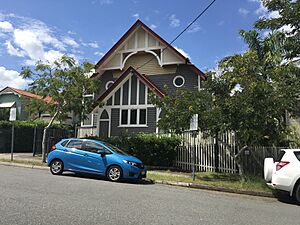East Brisbane, Queensland facts for kids
Quick facts for kids East BrisbaneBrisbane, Queensland |
|||||||||||||||
|---|---|---|---|---|---|---|---|---|---|---|---|---|---|---|---|
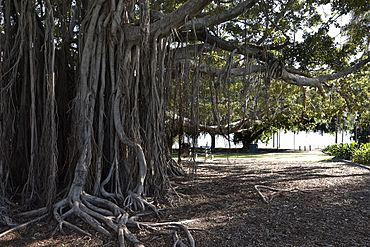
Mowbray Park in East Brisbane
|
|||||||||||||||
| Population | 6,186 (2021 census) | ||||||||||||||
| • Density | 3,090/km2 (8,000/sq mi) | ||||||||||||||
| Postcode(s) | 4169 | ||||||||||||||
| Area | 2.0 km2 (0.8 sq mi) | ||||||||||||||
| Time zone | AEST (UTC+10:00) | ||||||||||||||
| Location | 4.8 km (3 mi) SE of Brisbane CBD | ||||||||||||||
| LGA(s) | City of Brisbane (The Gabba Ward) | ||||||||||||||
| State electorate(s) | South Brisbane | ||||||||||||||
| Federal Division(s) | Griffith | ||||||||||||||
|
|||||||||||||||
East Brisbane is a lively suburb located in the city of Brisbane, Queensland, Australia. It's found just south of the city centre. In 2021, about 6,186 people called East Brisbane home.
Contents
Exploring East Brisbane's Location
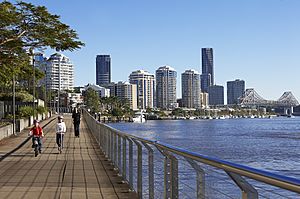
East Brisbane is about 4.8 kilometres (3 miles) south-east of Brisbane's main business area. It's mostly a place where people live, but it also has some small shops. You'll see many classic "Queenslander" houses here. These are special Australian homes built on stilts, often with wide verandahs.
The suburb is bordered by the Brisbane River to the north. To the east, you'll find Norman Park. Coorparoo is to the south-east, and Woolloongabba is to the south-west. Kangaroo Point is to the north-west. A creek called Norman Creek forms part of the border on the eastern side.
Major roads like Lytton Road, Wellington Road, and Latrobe Street run through the northern part. Vulture Street and Stanley Street are important roads in the south. The eastern side of East Brisbane has a small hill. From here, you can get nice views over Woolloongabba and the Brisbane city centre.
A Look Back: East Brisbane's History
East Brisbane has a rich history, with many important events shaping it.
Early Days and Land Sales
In 1851, Reverend Thomas Mowbray was one of the first people to buy land here. He bought 13 acres, which later became known as Mowbraytown. The first bridge over Norman Creek was built in 1855. Before this, people had to travel a long way to Stones Corner to cross the creek.
Many houses in East Brisbane were built during a big property boom in Brisbane in the 1880s. For example, the Heathfield Estate was developed and sold in 1886. Another area, the Longlands Estate, had 232 blocks of land sold in 1881. This area included streets like Fisher, Longlands, and Norman Street. In 1886, some land was also sold as East Woolloongabba.
Schools and Parks Emerge
East Brisbane State School first opened its doors on 10 July 1899. It had an official opening ceremony a couple of days earlier. The school celebrated its 50th birthday with a big carnival in November 1949.
Mowbray Park, a large park next to the Brisbane River, was created in 1904. In 1920, swimming baths were built in the river right next to the park. However, these baths had to close in 1940. This was because the river water became too dirty due to sewage being pumped into it further downstream.
Church of England Grammar School, often called Churchie, opened on 8 February 1912. It's now known as Anglican Church Grammar School. St Benedict's Catholic Primary School opened in 1928 behind St Benedict's Catholic Church. This school closed in 1971.
Transport and Changes
Until 1969, electric trams were a common way to get around East Brisbane. They ran along Stanley Street and Lytton Road. Trolley-buses also operated along Stanley Street until March of that year.
Who Lives in East Brisbane?
The population of East Brisbane has grown over the years.
- In 2011, there were 5,598 people.
- In 2016, the population grew to 5,934 people. About 53% were male and 47% were female.
- In 2021, the population reached 6,186 people.
The average age in East Brisbane is 31. The largest age group is young adults aged 20–24. Most people (63.2%) were born in Australia. Other common birthplaces include New Zealand, England, India, Brazil, and China. English is the main language spoken at home by 74.3% of residents. Other languages include Spanish, Mandarin, Portuguese, Nepali, and Italian.
Important Places and Buildings
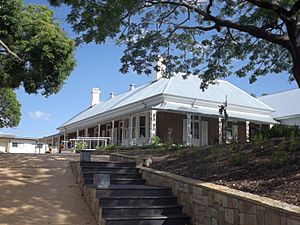
East Brisbane has several important landmarks. These include:
- Mowbray Park, a large and popular park.
- Heath Park, another green space.
- Anglican Church Grammar School, a well-known school.
Heritage-Listed Sites
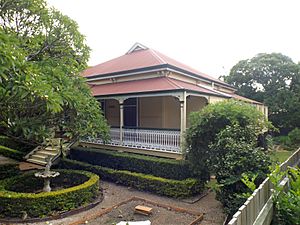
East Brisbane is home to many buildings and places that are protected because of their historical importance. These "heritage-listed" sites include:
- 59 Heath Street: Kitawah
- 56 Laidlaw Parade: Eskgrove
- 58 Latrobe Street: La Trobe
- 33, 60 & 78 Lytton Road: Mowbray Park and East Brisbane War Memorial
- 109 Lytton Road: Hanworth
- 22–28 Mowbray Terrace: Mowbraytown Presbyterian Church
- 81 Mowbray Terrace: thumb|St Benedict's Roman Catholic Church.St Benedict's Catholic Church
- 20 Norman Street: Former East Brisbane Primitive Methodist Churches
- 58 Stafford Street: Hester Villa
- 963 Stanley Street: Classic Cinema / Triumph Cinema
- 554 Vulture Street East: St Paul's Anglican Church
- 90 Wellington Road: East Brisbane State School
Learning in East Brisbane
East Brisbane has excellent schools for students of all ages.
- East Brisbane State School is a government primary school for students from Prep (the first year of school) to Year 6. It's located at 56 Wellington Road. In 2017, the school had 212 students.
- Anglican Church Grammar School (Churchie) is a private school for boys. It teaches students from Prep all the way through to Year 12. It's found on Oaklands Parade. In 2017, this school had a large enrolment of 1,792 students.
Sports in the Suburb
East Brisbane is a great place for sports fans! It's the home of the Eastern Suburbs FC soccer team. They play their games at Heath Park and are part of the Brisbane Premier League.
Getting Around East Brisbane
It's easy to travel in and out of East Brisbane using public transport.
- Buses are a common way to get around, with regular services.
- CityCat services, which are popular ferry boats, leave from Mowbray Park.
- The suburb is also a short walk from the Woolloongabba bus station and the Coorparoo Railway Station.
Famous People from East Brisbane
Several notable people have lived in or are connected to East Brisbane, including:
- William Baylebridge, a well-known poet and writer.
- Johnny Peebles, an Australian soccer player and administrator.
- Eric Robinson, a politician.
- Lydia Tritton, a journalist and public speaker.
- Robert J. Walsh, a medical scientist.
 | Claudette Colvin |
 | Myrlie Evers-Williams |
 | Alberta Odell Jones |



